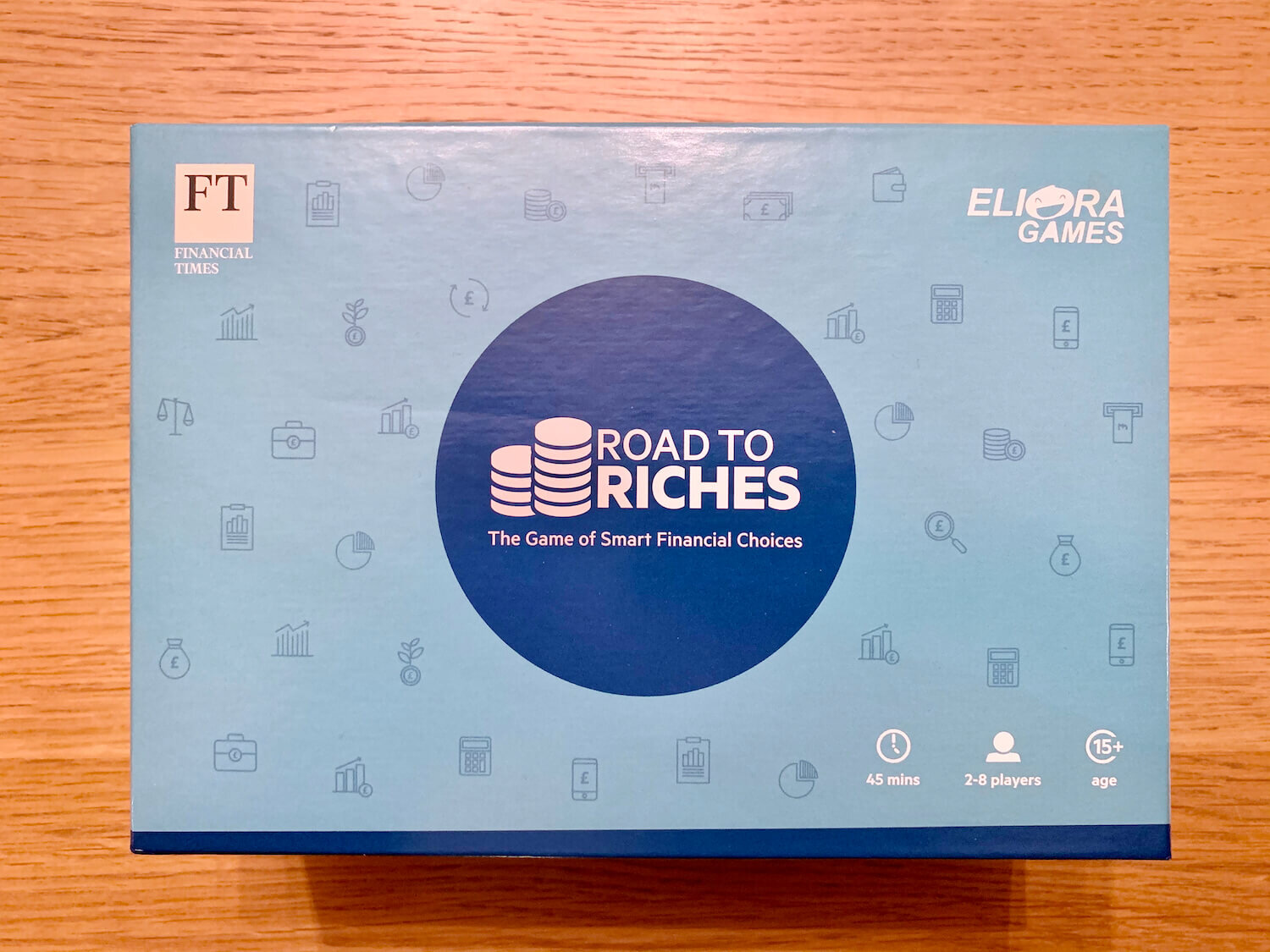Reviewing Road To Riches - The Board Game
/Road To Riches is a new board game launched by the Financial Times and Eliora Educational Games which aims to boost financial literacy amongst young people. In this guide and review, I’ll be looking in detail at the game, breaking down its mechanics, parsing out its financial lessons and commenting on how it holds up as a medium for financial education.
How To Play Road To Riches
The premise of the game is very simple. Ultimately, each players goal is to increase their financial security. To win, you have to hold £100,000 in cash and own 4 personal assets, a mortgage-free home, insurance, a retirement plan and education. If you run out of cash and can’t make a payment, you lose the game.
The game is played in rounds and each round has 5 sections, all players/teams must finish each section before moving on to the next. One player will pick up the cards each round and this rotates to the next player once the round is over.
Players start with £100,000 in cash and no other personal assets. To make things easier, I’ll go through one round of the game. Essentially, each round continues until one player/team wins.
Part 1: Knowledge Card
All players answer a multiple choice question to test their financial literacy. Players select their answer, A or B (using a double-sided card). If you’re right, you win £5,000, if you’re wrong you lose £5,000, simple as that.
Part 2: Personal Decisions
Players take it in turns to make their own financial decisions. For this section of the game, you’ll be focusing on the left hand page of your ‘Personal Assets’ booklet.
You have a range of choices here. You can buy a personal asset (ie. a mortgage free house, insurance, a retirement plan which doubles in price each round or you can pay for education). You mark any purchases made here with a pink pawn.
Every player starts out renting (costing £5,000 per turn) so you can choose to get a mortgage and purchase a home instead. To do this, you need to put down a £50,000 deposit. A mortgage costs £3,000 per turn.
Alternatively, players can buy interest-paying savings trust tokens for £10,000 each. These pay 10% interest (£1,000 each round).
Part 3: News Flash
In this section of the game, players respond to news stories and make predictions on stock and stock market prices. There are 6 stocks and 3 markets listed on the right hand side of your ‘Personal Assets’ booklet. Players put green tokens on stocks/markets they think will increase in value and red tokens on stocks/markets that they think will decrease in value. Up to 4 stocks/markets can move at once.
The flip side of the News Flash card will reveal the outcome. All players then receive money or pay money, depending on their selections.
Part 4: Pay Day/Bills
This part of the game will see players earning money and paying their bills. Everyone earns a salary of £10,000 (players who have bought the education asset receive £2,000 extra).
Any savings trust tokens pay interest (£1,000 per token). Finally, everyone paying rent pays £5,000 and everyone paying their mortgage bill pays £3,000.
Part 5: Wild Card
The starting player takes one Wild Card and resolves it. Wild cards may make players money, they may cost players money and sometimes, nothing happens (but this could depend on the personal assets that you own).
The End of The Game
Players go through parts 1-5 of each round until a winner emerges.
The Financial Lessons In Road To Riches
In the end, this game’s aim is to educate young people and my job is to determine if it can do that effectively. So, how does it hold up? I’ll start with the game’s strengths before pointing out some of its weaknesses.
The Game's Strengths
I’d say Road to Riches works on two levels. There are some obvious financial lessons and there are some more subtle lessons that more experienced players (or those more experienced with finance) will pick up on.
But first off, I’ll pick up on one obvious strengths of the game, its simplicity. Each player has a clear goal and since all players have to complete each part together before moving on to the next, confusion can be avoided.
It also succeeds in covering a lot of financial areas in a compact format. The knowledge cards test financial literacy directly, the news flash cards teach players the correlation between the news and stock/stock market prices, savings trust tokens teach players the important of compound interest.
But some of my favourite financial lessons are taught in a more subtle manner (although some of these may or may not be intentional, I’ll talk about this more in the weaknesses section).
The retirement plan doubles in price each round, teaching players the importance of saving for retirement early and the cost of not doing so. The education asset increases your salary directly but it also unlocks opportunities, some of which pop up in wild cards.
Speaking of wild cards, you might think buying insurance is just a £20,000 hurdle to winning the game. But insurance might be an important asset to have if something goes wrong (watch out for those wild cards).
There’s one particular wild card which highlights the game’s multi-layered thinking. The staircase breaks in your house. If you rent, the landlord pays, if you own the house, you pay and if you don’t have insurance, you pay big. This simple card teaches players about the complexity of personal finance.
Sure, renting costs £2,000 more per turn than a mortgage but at least the landlord is responsible if the house starts to fall apart. Like everything in personal finance, the correct approach is not always clear.
The Game's Weaknesses
Ultimately, I think Road to Riches will help improve financial literacy amongst it’s target audience (young people). That said, the game does fall short in a few ways, both in terms of mechanics and in its goal to financially educate.
Firstly, from a practical point of view, we ran into quite a few problems during our play throughs. One problem straight out of the gate was the clarity of the rule book. Each player is told to take a set of pawns. But it does not state how many pawns are in a set (you work this out early on but the rule book could make it clear that 4 pawns make a set).
The rule book also instructs players to take ‘4 red/green counters’. Does that mean 4 red and 4 green counters or 4 in total? It’s not clear because there aren’t many red/green counters provided. You could run into issues, for example, if more than 2 players/teams are playing.
It would also be made more interesting if players could hide some of their decisions to avoid influencing the decisions of other players. This happens at two particular points. When multiple choice questions are asked during the knowledge card round. Players should hide their A or B card selection and then reveal together. It also happens during the ‘News Flash’ round. It’s quite difficult for players to hide their stock/stock market predictions as the red/green counters are played in front of them on their booklet.
In terms of financial education, there are also some lessons muddied by the game’s mechanics. Take the red/green stock/stock market betting. Whilst I do think this is a clever way to teach students about the correlation between news and stock prices, there is a danger it encourages players to think betting on the stock market works like this in the real world.
In reality, when news occurs, stock prices respond. There isn’t a window period for stock pickers to bet, up or down, about the outcome of news that’s already broken. So, whilst it teaches one lesson, it might be inadvertently teaching another. Even though the latter isn’t grounded in reality.
It’s also unclear to me what the game’s attempting to teach about rentals versus mortgaged properties. Sure, mortgages are £2,000 cheaper every round (reflecting the reality that mortgage payments tend to be cheaper than rental payments in the real world) but, in the game, savings trusts pay out 10% interest.
It only takes a back of the napkin calculation to work out what’s better:
£50,000 deposit > £3,000 mortgage versus £5,000 rental = Saves you £2,000 each round
However, £50,000 in a Savings Trust > £5,000 interest (rental at £5,000) = Saves you £5,000 each round
The Savings Trust investment wins outright
The rental vs mortgage-owned property story is complex in reality. Especially if you take into account the return you would get on a long term index fund-invested deposit. I won’t get into the complexities here but my point is that the game makes the answer clear-cut, when in fact, it shouldn’t be. I’m also not sure whether that lesson was intended or not.
I understand that with any personal finance game, some aspects will need to be simplified to make it playable. But there are some occasions in this game when players can be punished financially for overthinking (even if they were right to overthink). Some of the knowledge card answers, for example, are debatable. And some make assumptions which players are not made aware of before the answers are revealed.
This problem crops up in the news flash section too. It was debatable, for example, whether some news stories would or wouldn’t affect other stock or stock market prices. After a few rounds we realised it was best not to overthink it.
3 Road To Riches House Rules
Whilst some of the games issues would need to be addressed at the design-level, you can fix some problems and change the length of the game (if you wish) with some simple house rules.
Hide Your A/B Selection: You want to make sure that players aren’t copying each other when a knowledge card is asked. To fix this, when a knowledge card is asked, all players could hide their selection and then count down to reveal their answers.
Hide Your Red/Green Counter Selection: To fix the issue of players copying decisions made by other players when a news flash occurs. Players make selections in their heads, get the counters ready and, after a count down, players place their red/green tokens simultaneously .
Less Starting Cash: Each player starts with £100,000 in cash (already fulfilling one of the game-winning conditions). This means a lot can be bought in the first round. To make things more interesting and/or to lengthen game time, start with less cash. Try starting with £20,000 instead.
Thank you to Eliora Games and The Financial Times for a review copy of this game. If you are thinking of purchasing the game, check it out on the Eliora Games website.
As always, all opinions are my own. What do you think about Road to Riches and the state of financial education in the UK as a whole? Let me know in the comments section down below.











